Related Research Articles

Catherine of Siena, TOSD was an Italian member of the Third Order of Saint Dominic in the Roman Catholic Church. She was a mystic, activist, and author who had a great influence on Italian literature and on the Catholic Church. Canonized in 1461, she is also a Doctor of the Church.
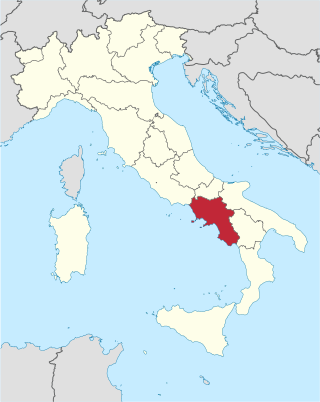
Campania is an administrative region of Italy; most of it is in the south-western portion of the Italian peninsula, but it also includes the small Phlegraean Islands and the island of Capri. The capital of the Campania region is Naples. As of 2018, the region had a population of around 5,820,000 people, making it Italy's third most populous region, and, with an area of 13,590 km2 (5,247 sq mi), its most densely populated region. Based on its GDP, Campania is also the most economically productive region in southern Italy and the 7th most productive in the whole country. Naples' urban area, which is in Campania, is the eighth most populous in the European Union. The region is home to 10 of the 58 UNESCO sites in Italy, including Pompeii and Herculaneum, the Royal Palace of Caserta, the Amalfi Coast and the Historic Centre of Naples. In addition, Campania's Mount Vesuvius is part of the UNESCO World Network of Biosphere Reserves.
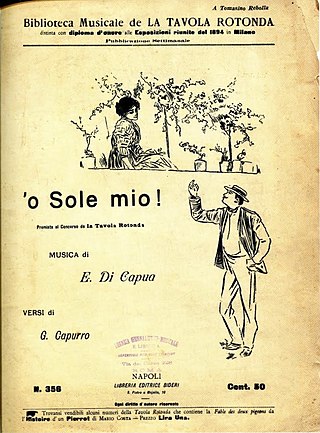
"'O sole mio" is a well-known Neapolitan song written in 1898. Its Neapolitan language lyrics were written by Giovanni Capurro and the music was composed by Eduardo di Capua (1865–1917) and Alfredo Mazzucchi (1878–1972). The title translates literally as "my sun" or "my sunshine". The lyrics have been translated to other languages.

Esther Béjarano was one of the last survivors of the Auschwitz concentration camp. She survived because she was a player in the Women's Orchestra of Auschwitz. She was active in various ways, including speeches and in music, in keeping the memory of the Holocaust alive. She was a regular speaker at the International Youth Meeting organised yearly at the Max Mannheimer Study Center in Dachau.

Santa Maria Capua Vetere is a town and comune in the province of Caserta, part of the region of Campania.

The Centro di Documentazione Ebraica Contemporanea is an independent cultural and historical institution in Milan, Italy, dedicated to promoting the study of the events, culture, and circumstances of the Jewish People in Italy in the context of modern times.
Liana Millu was a Jewish-Italian journalist, World War II resistance fighter and Holocaust survivor. She is best known for her autobiography Smoke over Birkenau.

Ettore Ovazza was an Italian Jewish banker. He was an early financer of Benito Mussolini, of whom he was a personal friend, and Italian fascism, which he supported until the Italian racial laws of 1938. He founded the journal La nostra bandiera. Believing that his position would be restored after the war, Ovazza stayed on after the Germans marched into Italy. Together with his wife and children, shortly after the Fall of Fascism and Mussolini's government during World War II, he was executed near the Swiss border by SS troops in 1943.
Ernesta Drinker Ballard was an American horticulturalist and feminist. Among the founders of the National Organization for Women, the National Abortion and Reproductive Rights Action League, and Women's Way, Ballard was the executive director of the Pennsylvania Horticultural Society from 1963 to 1981, credited by The New York Times with bringing its annual Philadelphia Flower Show to "international prominence."

Grete Berger was an Austrian-German stage and film actress whose career came to an end following the rise of the Nazi Party in 1933. Berger was murdered at Auschwitz concentration camp in 1944 shortly after her arrival.

Ilaria Capua is an Italian virologist and former politician, best known for her research on influenza viruses, particularly avian influenza, and her efforts promoting open access to genetic information on emerging viruses as part of pre-pandemic preparedness efforts.

The Stolpersteine in Croatia lists the Stolpersteine in the Republic of Croatia. Stolpersteine is the German name for stumbling blocks collocated all over Europe by German artist Gunter Demnig. They remember the fate of the Nazi victims being murdered, deported, exiled or driven to suicide.

Stolpersteine is the German name for small, cobble stone-sized memorials installed all over Europe by German artist Gunter Demnig. They remember the fate of the victims of Nazi Germany being murdered, deported, exiled or driven to suicide. The first Stolperstein in Genoa, the capital of the Italian region of Liguria, was installed in January 2012.

Stolpersteine is the German name for small, cobblestone-sized memorials placed around Europe by the German artist Gunter Demnig. They commemorate the victims of Nazi Germany who were murdered, deported, exiled or driven to suicide. The first Stolpersteine in Milan, the capital of the Italian region of Lombardia, were established in January 2017.
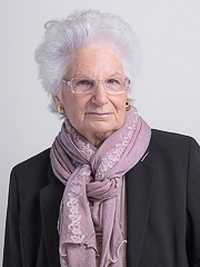
Liliana Segre is an Italian Holocaust survivor, named senator for life by President Sergio Mattarella in 2018 for outstanding patriotic merits in the social field.
Gindetta Mariani (1870-1950), also credited as Guiditta Mariani was an Italian botanist, mycologist, and plant taxonomist. The standard author abbreviation Mariani is used to indicate this person as the author when citing a botanical name.
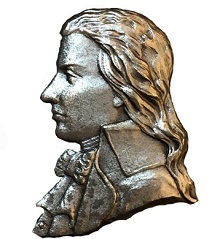
Luigi Capotorti was an Italian composer of both sacred and secular music. He was the maestro di cappella of several Neapolitan churches; the composer of ten operas, five of which premiered at the Teatro San Carlo in Naples; and a teacher of composition and singing whose students included Stefano Pavesi and Saverio Mercadante. Born in Molfetta, he studied violin and composition at the Conservatorio di Sant'Onofrio in Naples and spent his entire career in that city. In his later years, Capotorti retired to San Severo, where he died at the age of 75.

The Unione Giovani Ebrei d'Italia (UGEI) is an Italian organization for young Jewish people. It is the youth branch of the Union of Italian Jewish Communities, the umbrella organization for Jewish communities and organizations in the country. It represents all Italian Jews between 18 and 35 years old, as well as all local Jewish youth organizations.
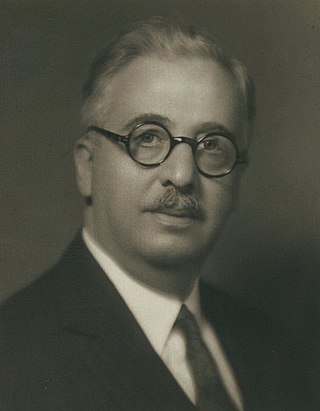
Lionello Arturo Lopes Perera was a banker, philanthropist and patron of the arts and music, active in New York at the beginning of the 20th century.
References
- ↑ Friis, Ib; Ryding, Olof (2001). Biodiversity Research in the Horn of Africa Region: Proceedings of the Third International Symposium on the Flora of Ethiopia and Eritrea at the Carlsberg Academy, Copenhagen, August 25-27, 1999. Kgl. Danske Videnskabernes Selskab. ISBN 9788778762467 . Retrieved 22 August 2018.
- ↑ "Di Capua, Ernesta". digital-library.cdec.it (in Italian). CDEC - Centro di Documentazione Ebraica - Digital Library. Retrieved 22 August 2018.
- ↑ Eggli, Urs; Newton, Leonard E. (2013). Etymological Dictionary of Succulent Plant Names. Springer Science & Business Media. p. 65. ISBN 9783662071250.
- ↑ International Plant Names Index. Di Capua.